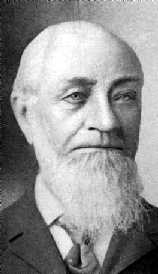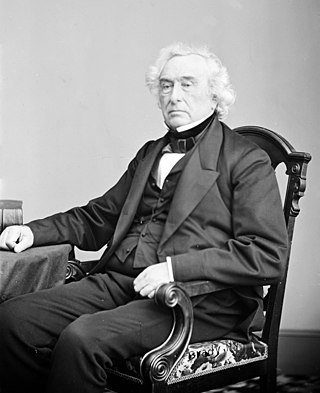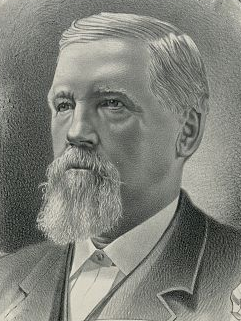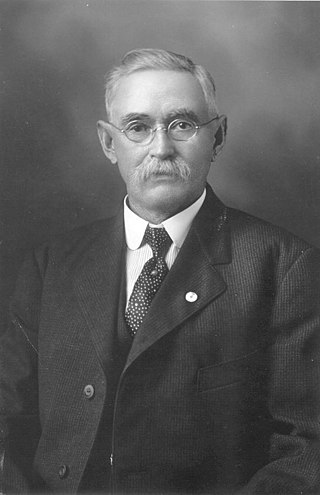Biography
Ireland was born in Pennsylvania but lived most of his life in Washington, D.C., as chief clerk in the offices of the U.S. Post Office Department. When the National Order of the Grange of Patrons of Husbandry was founded in 1866, Ireland served as the first treasurer until 1870. [1] He was an avid Freemason, Ireland added valuable knowledge to organizational systems and methods in the formative period of the Grange movement. His ability to be a critic and adviser in setting up the work of the Grange created a balance of knowledge and inspiration. His accounting abilities also aided in the system of financial policy within the Grange. He died on December 24, 1891, and was buried in Mount Vernon Cemetery in Philadelphia.
The other founders of the Grange were Oliver Hudson Kelley, William Saunders, Francis M. McDowell, John Trimble, Aaron B. Grosh, John R. Thompson and Caroline A. Hall. [2]
The first subordinate grange was founded in Washington, D.C., on January 8, 1868, and Ireland served as the schoolmaster. [3]
Ireland was responsible for the publication of The Journals of Proceedings for the organization and compiled ten annual sessions from 1875 to 1883.
At the twelfth session of the Grange, Ireland was elected to fill the remaining term as secretary and was re-elected three times afterward. [1]

The Grange, officially named The National Grange of the Order of Patrons of Husbandry, is a social organization in the United States that encourages families to band together to promote the economic and political well-being of the community and agriculture. The Grange, founded after the Civil War in 1867, is the oldest American agricultural advocacy group with a national scope. The Grange actively lobbied state legislatures and Congress for political goals, such as the Granger Laws to lower rates charged by railroads, and rural free mail delivery by the Post Office.

Daniel Coit Gilman was an American educator and academic. Gilman was instrumental in founding the Sheffield Scientific School at Yale College, and subsequently served as the second president of the University of California, Berkeley, as the first president of Johns Hopkins University, and as founding president of the Carnegie Institution. Eponymous halls at both Berkeley and Hopkins pay tribute to his service. He was also co-founder of the Russell Trust Association, which administers the business affairs of Yale's Skull and Bones society. Gilman served for twenty five years as president of Johns Hopkins; his inauguration in 1876 has been said to mark "the starting point of postgraduate education in the U.S."

Oliver Hudson Kelley was one of the key founders of the National Grange of the Order of Patrons of Husbandry, a fraternal organization in the United States.

William Saunders was a botanist, nurseryman, landscape gardener, landscape designer, and horticulturist. As the chief experimental horticulturalist in the US, he was responsible for the introduction of many fruits and vegetables to American agriculture; with seven others he founded the National Grange of the Order of Patrons of Husbandry, a fraternal organization in the United States.

Francis Marion McDowell was an American banker and farmer and a co-founder of the National Grange of the Order of Patrons of Husbandry, a fraternal organization in the United States.

Reverend Aaron Burt Grosh, a Universalist minister, was one of the eight founders of the National Grange of the Order of Patrons of Husbandry, a fraternal organization in the United States. He had a major part in the design of the Grange ritual and was also responsible for the various songs used during various celebrations of the Grange.
John Richardson Thompson was one of the eight founders of the National Grange of the Order of Patrons of Husbandry, a fraternal organization in the United States.

Caroline Arabella Hall was one of the eight founders of the National Grange of the Order of Patrons of Husbandry, an American agricultural fraternal organization better known as The Grange or Grange Hall.

Francis Granger was an American politician who represented Ontario County, New York, in the United States House of Representatives for three non-consecutive terms. He was a leading figure in the state and national Whig Party, particularly in its moderate-conservative faction. He served as a Whig vice presidential nominee on the party's multi-candidate 1836 ticket and, in that role, became the only person to ever lose a contingent election for the vice presidency in the U.S. Senate. He also served briefly in 1841 as United States Postmaster General in the cabinet of William Henry Harrison. In 1856, he became the final Whig Party chairman before the party's collapse, after which he joined the Constitutional Union Party.
The farmers' movement was, in American political history, the general name for a movement between 1867 and 1896. In this movement, there were three periods, popularly known as the Grange, Alliance and Populist movements.

Group Health Cooperative, formerly known as Group Health Cooperative of Puget Sound, later more commonly known as Group Health, was an American nonprofit healthcare organization based in Seattle, Washington. It was acquired by Kaiser Permanente in 2017 and now serves as the Kaiser Washington region. The new region would serve the majority of Washington state except for the Southwest Washington counties of Clark and Cowlitz, which would continue to be served by the Portland-area Kaiser Permanente Northwest.

Esto perpetua is a Latin phrase meaning "let it be perpetual".

Thomas Joseph Shahan was an American Catholic theologian and educator, born at Manchester, New Hampshire, educated at Collège de Montréal (1872) at the Pontifical North American College, and at the Propaganda Fide in Rome.

The Oliver Kelley Farm is a farm museum in Elk River, Minnesota, United States. From 1850 to 1870 it was owned by Oliver Hudson Kelley, one of the founders of the National Grange of the Order of Patrons of Husbandry, the country's first national agrarian advocacy group. The Oliver Kelley Farm is operated as a historic site by the Minnesota Historical Society. It was declared a National Historic Landmark in 1964 under the name Oliver H. Kelley Homestead—which also places it on the National Register of Historic Places—for its national significance in the themes of agriculture and social history. It was nominated as a representative of the beginnings of agrarian activism in the United States, setting the stage for the Farmers' Alliance and the People's Party of the late 19th century.

Alson Jenness Streeter was an American farmer, miner and politician who was the Union Labor Party nominee in the United States presidential election of 1888. He was also an early member of the National Grange of the Order of Patrons of Husbandry following its foundation in the 1860s and supported Granger Laws while in office.
William Ireland may refer to:

The Order of the Sovereigns of Industry, established in 1874, was an American mutualist movement targeted at urban workers which attempted to end perceived social ills through the establishment of consumer cooperatives. The organization's form and mission was directly inspired by the Order of Patrons of Husbandry, a parallel organization established for the benefit of American farmers. After a few years a lengthy and severe financial depression of the American economy caused a net cash flow crisis in the stores associated with the organization beginning in 1878. Deep financial woes forced the dissolution of the Order in 1880.

John Aldus McSparran was a prominent landholder and politician from Lancaster, Pennsylvania.

Mount Vernon Cemetery is a historic rural cemetery located at 3499 West Lehigh Avenue in the East Falls neighborhood of Philadelphia, Pennsylvania. It was established in 1856, is 27 acres in size and contains over 18,000 graves. It was neglected for decades by an absentee landlord. No plots have been sold since 1968, it was not open to the public, many graves fell into disrepair and the cemetery became heavily overgrown. In 2021, a Philadelphia judge ordered the cemetery be placed in conservatorship due to neglect.

John Caldwell was a nineteenth-century farmer and timber man of northern Michigan, associated with Missaukee County, Michigan. He was employed for several years by the Mitchell Brothers Company, a land agent firm in several states, dealing with large tracts of timber for making lumber. He homesteaded 100 acres, and had a diversified system of farming that proved successful.

















